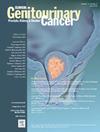Geographic Distribution of Racial Differences in Renal Cell Carcinoma Mortality
IF 2.7
3区 医学
Q3 ONCOLOGY
引用次数: 0
Abstract
Objective
To examine the geographic variations in Renal cell carcinoma (RCC) -specific death disparities from competing causes among Hispanic, non-Hispanic White, non-Hispanic Black, and Asian/Pacific Islander RCC patients. RCC outcomes in specific racial/ethnic population warrants further research and it is unknown whether racial/ethnic differences in RCC survival vary geographically within the US.
Methods
This retrospective cohort study was conducted to assess all RCC patients from 2014 to 2021. Data was extracted from the Surveillance, Epidemiology, and End Results (SEER) database. The primary outcome was RCC-related mortality.
Results
The study included 85,975 patients with RCC from 16 geographic areas within the SEER database. Kaplan–Meier analysis showed that Hispanic patients had the worst survival outcome (P < .001 by log rank test). In the multivariable competing-risks regression, Hispanics had a higher risk of cancer-specific mortality (hazard ratio [HR] 1.29, 95% CI, 1.20-1.38, P ˂ .001) compared with non-Hispanic Whites. The increase in the risk of RCC-related death with Hispanic race/ethnicity was consistent across all major subgroups stratified by the covariables. In stratified analyses of geographic regions, there were 3 areas in which Hispanics had worse RCC-specific survival (Los Angeles: HR 1.22, 95% CI, 1.06-1.41, P = .005; Greater California: HR 1.125, 95% CI, 1.15-1.37, P < .001; Atlanta, Georgia: HR 1.95, 95% CI, 1.32-2.88, P = .001).
Conclusion
These results demonstrate that population-level variations in RCC survival among Hispanics and non-Hispanic Whites were associated with a small number of geographic regions. Targeted interventions in these regions may be conducive to alleviating RCC care differences at the national level.
肾细胞癌死亡率种族差异的地理分布。
目的:研究西班牙裔、非西班牙裔白人、非西班牙裔黑人和亚洲/太平洋岛民肾细胞癌(RCC)患者因竞争原因特异性死亡差异的地理差异。特定种族/民族人群的RCC结果值得进一步研究,目前尚不清楚在美国,RCC存活率的种族/民族差异是否存在地理差异。方法:本回顾性队列研究对2014年至2021年的所有RCC患者进行评估。数据来自监测、流行病学和最终结果(SEER)数据库。主要终点为rcc相关死亡率。结果:该研究纳入了SEER数据库中来自16个地理区域的85,975例RCC患者。Kaplan-Meier分析显示,西班牙裔患者的生存结局最差(log rank检验P < 0.001)。在多变量竞争风险回归中,与非西班牙裔白人相比,西班牙裔白人的癌症特异性死亡风险更高(风险比[HR] 1.29, 95% CI, 1.20-1.38, P小于0.001)。根据协变量分层的所有主要亚组中,西班牙裔种族/民族的rcc相关死亡风险的增加是一致的。在地理区域的分层分析中,有3个地区的西班牙裔患者的rcc特异性生存率较差(洛杉矶:HR 1.22, 95% CI, 1.06-1.41, P = 0.005;大加州:HR 1.125, 95% CI 1.15-1.37, P < 0.001;乔治亚州亚特兰大:HR 1.95, 95% CI 1.32-2.88, P = .001)。结论:这些结果表明,西班牙裔和非西班牙裔白人的RCC生存率在人口水平上的差异与少数地理区域有关。这些地区有针对性的干预措施可能有助于减轻国家层面上的碾压细胞癌护理差异。
本文章由计算机程序翻译,如有差异,请以英文原文为准。
求助全文
约1分钟内获得全文
求助全文
来源期刊

Clinical genitourinary cancer
医学-泌尿学与肾脏学
CiteScore
5.20
自引率
6.20%
发文量
201
审稿时长
54 days
期刊介绍:
Clinical Genitourinary Cancer is a peer-reviewed journal that publishes original articles describing various aspects of clinical and translational research in genitourinary cancers. Clinical Genitourinary Cancer is devoted to articles on detection, diagnosis, prevention, and treatment of genitourinary cancers. The main emphasis is on recent scientific developments in all areas related to genitourinary malignancies. Specific areas of interest include clinical research and mechanistic approaches; drug sensitivity and resistance; gene and antisense therapy; pathology, markers, and prognostic indicators; chemoprevention strategies; multimodality therapy; and integration of various approaches.
 求助内容:
求助内容: 应助结果提醒方式:
应助结果提醒方式:


